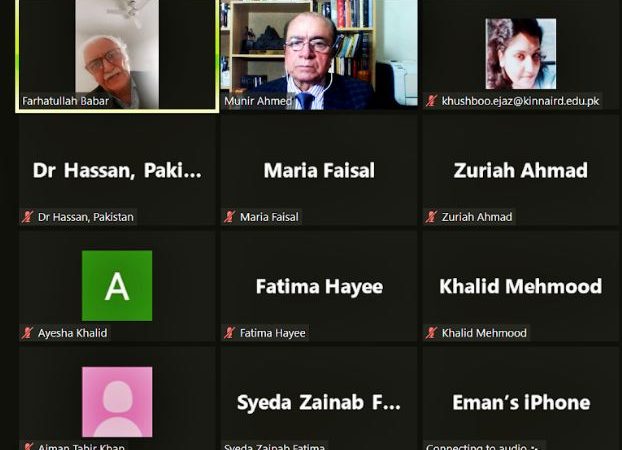No trust on new Election Management System, good turnout

DNA
Islamabad, JAN 27: The participants of a webinar on fair and free elections have shown their doubts on a reasonable turnout for the February 8 polling. About 10 million eligible youth and women will remain unregistered for casting their vote because they have not been issued CNICs. Meanwhile, the rumours about the threats of terrorist attacks on the polling stations are being spread. One of the main political parties has already been pushed out of the race. So, we shall not expect a good turnout even in the forthcoming elections. The result of the fresh polls will enhance the political fiasco. Such a situation would cause further embarrassment to a country’s national repute. But, the state institutions seem unbothered.
The webinar was organized by the Devcom-Pakistan Centre for Geopolitical Studies on Saturday. The guest speakers included former Senator Farhatullah Babar, Kinnaired College Associate Professor of Political Science Dr. Khushboo Ejaz, Bahria University Associate Professor Dr Hassan Daud Butt, and Devcom-Pakistan Executive Director Munir Ahmed.
Former Senator Farhatullah Babr has shown his “no trust” on the new Election Management System (EMS) that the Election Commission of Pakistan introduced the other day. He termed the political parties were not briefed about the new system for the transmission of election results. It has added to fears and doubts on the merit of forthcoming elections. One of the main political parties has already been pushed out. We repeatedly listen about the level playing field but actually it is missing the most now. We shall not be surprised if the EMS fails at the moment of election results submission.
He said some powers are consistently maneuvering the parliament, judiciary and media. A resolution in the senate against the general elections, action against the protesting Baloachi families in front of the National Press Club and media maneuvering are the recent ones. We need to keep raising our voices against the maneuvers. He feared the new general elections will increase the political instability if rightful measures are not taken to get away from the maneuvering.
Speaking on the occasion, Devcom-Pakistan Executive Director Munir Ahmed said the people still have serious doubts on the merit of the February 8 elections. That is why the election campaigns are yet to take the conventional hype. On the other hand, the general public seems reluctant after the PTI is divided into factions, and one faction is pushed to the wall. It would hamper the overall turnout. Secondly, the people believe that the new Election Management System, a PKR 280 million system to ensure timely transmission of election results, would be used for maneuvering.
He urged the citizens, especially the young voters to come out on the polling day to cast their vote in any case. Threats may be used by some quarters to keep the turnout low. But, everyone shall exercise its right to vote without considering the outcome.
Dr. Khushboo Ejaz we have not seen any fair and free elections in the history of the country. The coming elections will be the worst in the form of pre-election rigging. One party has already been divided and sidelined, while social media mapping is used for segregation of voters’ polling stations. Even the women of the same family have been assigned different polling stations, in most of the cases far away from each other. Women usually are dependent on their counterparts for commuting on election day in particular. This would limit the women voters’ turnout. Threats of untoward incidents and militancy are spread, perhaps, intentionally to keep the turnout low.
Dr. Hassan Daud Butt said 2024 will be the historic year as 60 percent of the world will be going to elections including Pakistan, India, Russia and the US. It would have a significant impact not only on the internal situation of the respective country, but its spillover to the region and internationally. The voters shall see Pakistan’s elections in the light of the manifestos of the contesting parties and their past performance in development, international relations and geopolitical positioning. He said the public’s distrust has increased on the system, political parties, and their agendas. The coming elections will be more urban-centric sans the young leadership, and with a meagre voice of the rural communities. The winning party is unlikely to be accepted by the losing ones.
Dr Hassan highlighted that though our electoral process is aged, and needs reforms as it favours the elite,yet people should vote based on their own ideologies and agendas and support candidates who promote development and create opportunities. He highlighted that the way that elections are held and manifestos are made can appeal to different groups of voters.youth he believed are more knowledgeable now and can use various platforms including social media to learn about candidates and their agendas and whether they are capable to address the contemporary issues pakistan is facing including geopolitical and economic challenges. False narrative needs to be addressed and in future all political parties will have challenges if they do not embrace technology and work together to strengthen parliament.
Related News

Pakistan Navy unveils cutting-edge Hangor-Class Submarine in China
ISLAMABAD, AUG 15 /DNA/ – The launching ceremony of submarine PNS/M MANGRO (Desig) was heldRead More

PM, Bangladesh envoy discuss bilateral relations
ISLAMABAD, AUG 15 (DNA) — Prime Minister of Pakistan on Friday received the High CommissionerRead More


Comments are Closed